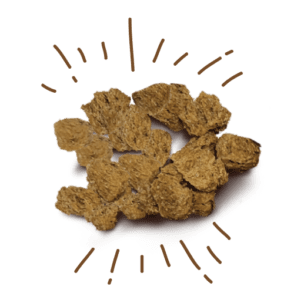Bernie’s Perfect Poop helps battle mental health disorders in dogs
When your dog suffers from mental health disorders, you want to do what you can to stop it. Whether it’s depression, anxiety, stress or aggression, Bernie’s Perfect Poop may help.

- Good dog gut health is critical for your dog’s mental health and welfare. As many of the neurotransmitters the brain makes are also made in the gut, the gut is often called a ‘second brain.’ These neurotransmitters are ones that play key roles in a dog’s mental health. Neurotransmitters like dopamine, serotonin and gamma-aminobutyric acid being balanced may be the key to ensuring good mental health in your dog.
- Food and diet impact your dog’s mental health and mood. Good dog gut health relies on your dog’s ability to digest and process the food you give him. A poor gut can happen if there’s poor absorption of nutrients, and this affects your dog’s mental health. Bernie’s helps your dog digest food and absorb nutrients better, and this leads to a healthier dog gut.
- The key to your dog digesting his food and feeding helpful bacteria in his gut is ensuring appropriate levels of quality fiber. When there’s quality fiber in your dog’s gut, good bacteria feed off the waste and create a healthy microbiome. The perfect combination of Miscanthus grass, pumpkin and flaxseed in Bernie’s gives your dog the fiber they need for clearer mental health.
- Bernie’s Perfect Poop creates the perfectly balanced gut microbiome in your dog, by including a combination of prebiotics and probiotics in every bag. As research continues to explore the connection between a dog’s brain and his gut (the gut-brain axis), we find it to be pivotal to behavior and mental health. With good dog gut health, your dog doesn’t have to worry about harmful bacteria destroying the communication between the gut and the brain. This combination of prebiotics and probiotics stimulates a balanced gut, and better mental health for your dog.
- When your dog is able to nourish the cells of his body with nutrients from food, he has a healthier body and gut. The unique combination of enzymes in Bernie’s helps break the food you feed your dog down, and this encourages the optimal absorption of nutrients. This helps build a stronger gut and a stronger mental frame of mind in your dog.
- A happier, healthier life for your best friend starts with good dog gut health. Bernie’s Perfect Poop is a 4-in-1 combination of fiber, prebiotics, probiotics, and enzymes. This combination helps your dog’s gut be the healthiest it can be, and can curb many of the mental health issues like depression or anxiety your dog may face. Bernie’s helps balance the digestive tract and provide a better gut microbiome.



